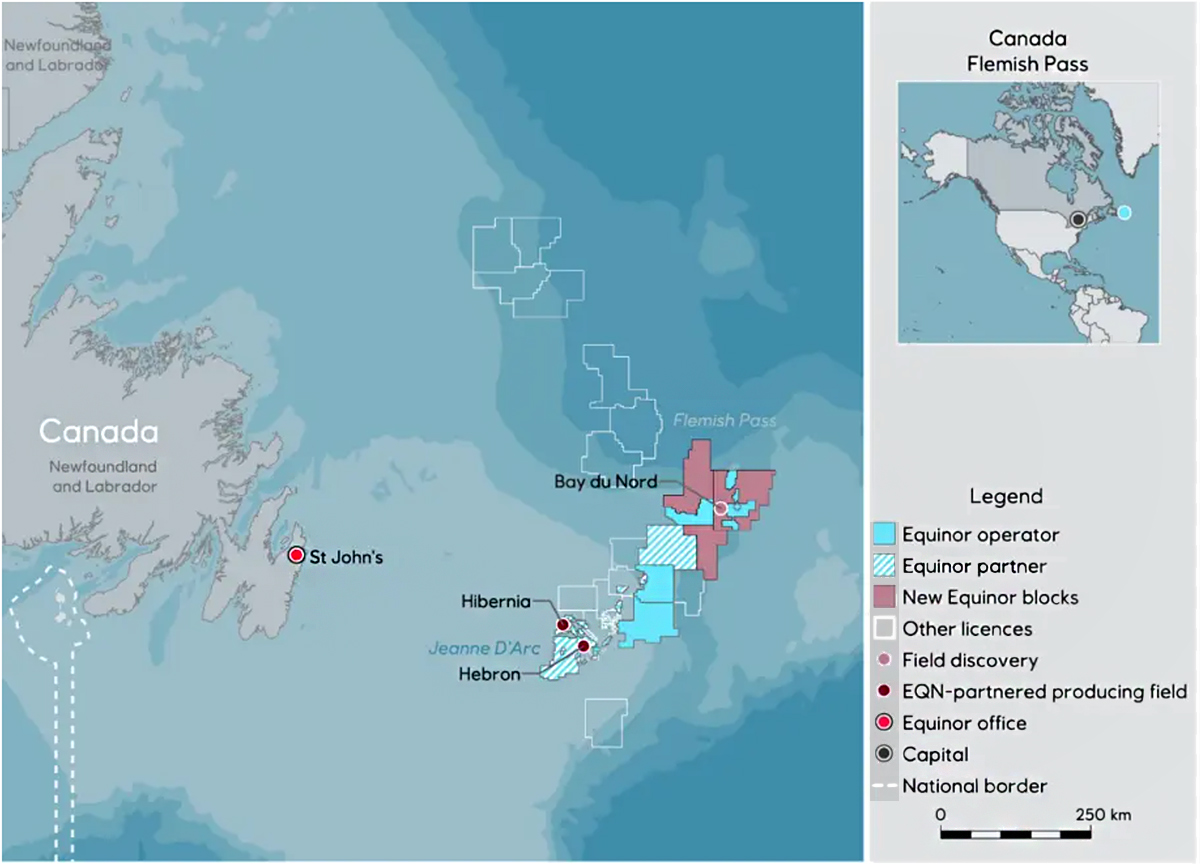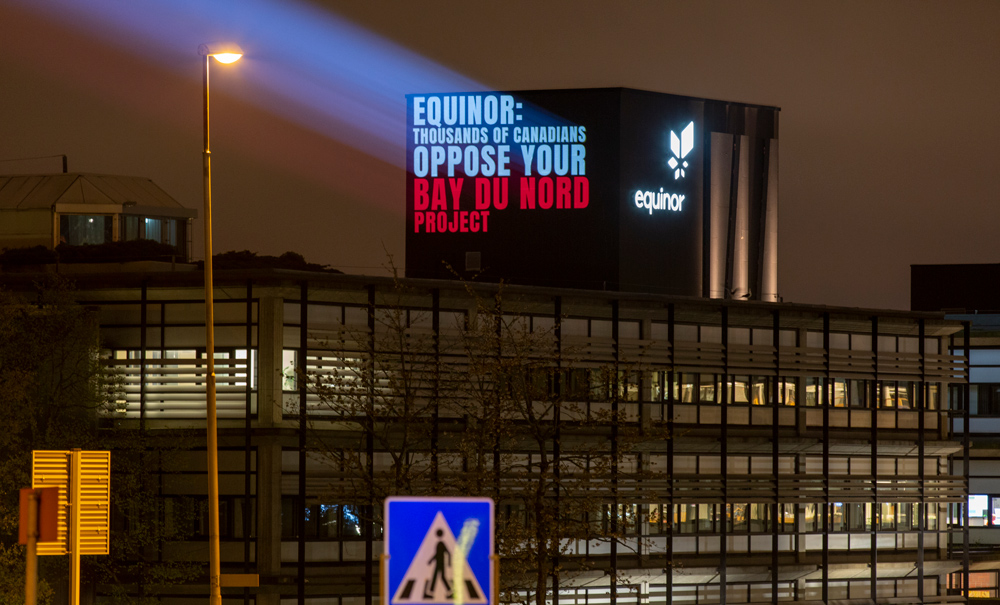Account Login
Don't have an account? Create One

The Sierra Club of Canada Foundation and Mi’gmawe’l Tplu’taqnn Incorporated (MTI, representing eight Mi’kmag communities in New Brunswick) are appealing a legal decision issued earlier this year related to the Bay du Nord offshore oil project. Among other things, they insist the Canadian government has failed to properly weigh the project’s “downstream emissions” and overall environmental harm of the project.
The proposed Equinor-led oil project, while currently on hold, was released from environmental assessment in April 2022. The ongoing legal case was launched shortly after by Équiterre and the Sierra Club of Canada Foundation, with MTI joining. Équiterre has opted not to take part in pressing the case to the Federal Court of Appeal.
First kick at the can
As ABM has reported, the groups were represented by lawyers with Ecojustice and collectively argued deficiencies existed in the environmental review for the project, particularly what was described as a failure on the part of the federal regulator to account for both greenhouse gas emissions (GHGs) from crude oil production and downstream emissions. Downstream emissions include GHGs produced through the end use of refined petroleum products. Examples of end-use include gasoline burned in internal combustion engine cars, or emissions after burning of fuel oil in power plants.
One of the clear and practical challenges in accounting for downstream emissions is they can occur in places outside of Canada, as crude and petroleum products are shipped around the world.
That said, the idea of accounting for all emissions in natural resource projects is now a staple in public debates around oil projects. It’s also not a new idea. Looking back to 2017, the National Energy Board said it was ready to consider downstream emissions in its review of the proposed Energy East Pipeline Project. The suggestion received almost as much attention—almost—as the project proposal itself (though the pipeline famously faced opposition on several fronts and was ultimately cancelled in 2017).

Bay du Nord was reviewed under the Canadian Environmental Assessment Act (CEAA, 2012)—the country’s main environmental review law—prior to the introduction of the Impact Assessment Act (IAA) in 2019. While the law changed years ago, any project reviews started prior to that change were completed under the law as it stood at that time. Regardless, the Government of Canada has stated in interpretive material online, downstream emissions under the current IAA are still not required to be accounted for in an oil and gas project environmental review.
In releasing the Bay du Nord Project from the environmental assessment process, it’s also worth noting the stipulations set for the project’s permission to proceed included a requirement to reach “net zero” emissions by 2050. Net zero refers to the idea of allowing no, new greenhouse gas emissions. It can be reached by a project capturing emissions, or a combination of emissions controls plus offsets. That said, net zero accounting for oil only refers to GHG emissions at production. It does not involve downstream emissions.
In his legal decision in June on the challenge to the release from environmental assessment, Justice Russell Zinn clearly rejected the idea of having to account for downstream emissions (for more on the decision, see the latest issue of ABM). In his discussion, among other things, he highlighted the challenges in estimating such emissions.
After some time spent reviewing the details in Zinn’s reasoning, Ecojustice, on behalf of the Sierra Club and MTI, announced they are pressing the case to the Federal Court of Appeal.
“To date, Canada has been able to avoid scrutiny for its exported emissions,” said Ecojustice lawyer Ian Miron, highlighting Canada’s status as an energy exporter.
“The CEAA (2012) … requires considering ‘environmental effects’ which is a broad term that in our view obligated the Minister to consider downstream emissions. An environmental impact assessment that ignores 90 per cent of a project’s impacts isn’t a real impact assessment,” he said.
The groups assert the Government of Canada is opting to “turn a blind eye to the role Canadian fossil fuels play in deepening the (climate) crisis,” if not taking at least a rough estimate on all emissions into account.
“Our only hope for a safe future is to stop fossil fuel expansion and switching to clean energy now. Equinor needs to stop fighting us in court and start keeping its corporate promises to live within safe climate limits by abandoning Bay du Nord and oil projects like it around the world,” said Sierra Club of Canada national programs director Gretchen Fitzgerald, in a press release.
Meanwhile, Equinor is readying for new exploratory drilling in the Flemish Pass Basin next summer. The company has a history in the province’s offshore oil and gas sector dating back to the 1990s (through Norsk Hydro, then as Statoil after a 2007 merger of Norsk Hydro’s oil division with Statoil, with a name change to Equinor in 2018).
Equinor has a stake in the Exxon-Mobil operated Hebron and Hibernia projects, as well as the Hibernia Southern Extension, all in an area known as the Jeanne d’Arc Basin. Through costly exploration, it has identified an increasing amount of oil resource in the Flemish Pass Basin, an area albeit further from shore and with drilling required at greater depths. Mizzen was Equinor’s first discovery there, in 2009. Then came Harpoon in 2013 and the larger Bay du Nord find the same year. In 2016, there was Baccalieu, about 15 kilometres from the main Bay du Nord site. In 2020, discoveries were made at locations known as Cappahayden and Cambriol. New drilling may add to the total estimated reserves available and affect the company’s final decisions around any development.
BP is a partner in the Flemish Pass finds and proposed Bay du Nord development. That company made headlines in summer 2022 when it announced a deal that saw it exit the Alberta oilsands but expand its position off Newfoundland and Labrador, taking Cenovus’ stake in the Bay du Nord project.
Comment policy
Comments are moderated to ensure thoughtful and respectful conversations. First and last names will appear with each submission; anonymous comments and pseudonyms will not be permitted.
By submitting a comment, you accept that Atlantic Business Magazine has the right to reproduce and publish that comment in whole or in part, in any manner it chooses. Publication of a comment does not constitute endorsement of that comment. We reserve the right to close comments at any time.
Cancel